初二英语词汇
- 格式:doc
- 大小:116.00 KB
- 文档页数:8
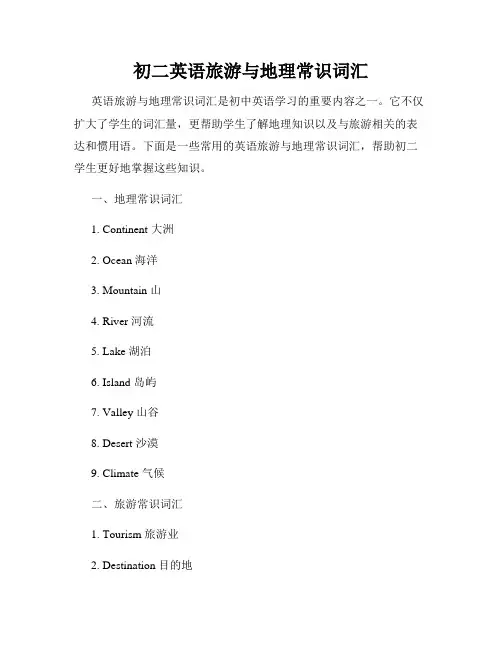
初二英语旅游与地理常识词汇英语旅游与地理常识词汇是初中英语学习的重要内容之一。
它不仅扩大了学生的词汇量,更帮助学生了解地理知识以及与旅游相关的表达和惯用语。
下面是一些常用的英语旅游与地理常识词汇,帮助初二学生更好地掌握这些知识。
一、地理常识词汇1. Continent 大洲2. Ocean 海洋3. Mountain 山4. River 河流5. Lake 湖泊6. Island 岛屿7. Valley 山谷8. Desert 沙漠9. Climate 气候二、旅游常识词汇1. Tourism 旅游业2. Destination 目的地3. Sightseeing 观光, 游览4. Tourist 旅游者5. Hotel 酒店6. Flight 航班7. Passport 护照8. Visa 签证9. Guide 导游10. Souvenir 纪念品通过了解这些旅游与地理常识词汇,学生可以拓展视野,了解世界各地的地理环境和旅游资源。
同时,学会使用这些词汇也能够帮助学生更好地进行英语口语交流,提升语言表达能力。
在英语课堂上,教师可以采用多种形式和方法教授这些词汇。
以下是一些教学推荐:1. 使用图片和地图:通过展示适合学生年龄的图片和简单的地图,让学生了解不同大洲、国家和地理特点,然后加以词汇讲解。
2. 观看相关视频:在课堂上播放有关旅游景点和地理环境的视频,让学生通过视觉和听觉感受到真实的场景,加深对词汇的印象。
3. 创设情境对话:设计旅游场景对话,让学生在实际情景中运用这些词汇。
例如:学生可以扮演导游和游客,模拟旅游咨询和交流。
4. 辩论活动:组织辩论活动,让学生辩论旅游业对地方经济的影响,鼓励学生使用词汇以提升语言运用能力。
5. 制作海报或旅游手册:让学生自主选择一个国家或旅游目的地,制作相关的海报或旅游手册,通过展示和分享以提升对词汇的理解和运用。
最后,老师和家长应该给予学生足够的练习机会,帮助他们记忆和巩固这些词汇。
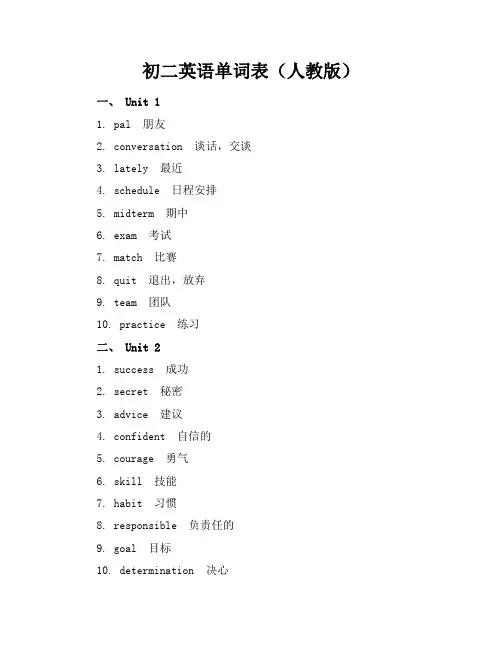
初二英语单词表(人教版)一、 Unit 11. pal 朋友2. conversation 谈话,交谈3. lately 最近4. schedule 日程安排5. midterm 期中6. exam 考试7. match 比赛8. quit 退出,放弃9. team 团队10. practice 练习二、 Unit 21. success 成功2. secret 秘密3. advice 建议4. confident 自信的5. courage 勇气6. skill 技能7. habit 习惯8. responsible 负责任的9. goal 目标10. determination 决心三、 Unit 31. festival 节日2. lantern 灯笼3. mooncake 月饼4. relative 亲戚5. couple 夫妻6. reunion 团聚7. rise 上升8. performances 表演9. dragon 龙10. boat 船四、 Unit 41. invention 发明2. inventor 发明家3. achievement 成就4. light bulb 电灯泡5. electricity 电6. immediately 立即7. influence 影响8. successively 连续地9. permission 许可10. telegraph 电报五、 Unit 51. agreement 协议2. disagreement 分歧3. decision 决定4. arrange 安排5. satisfy 满足6. concern 关系,关心7. independence 独立8. argue 争论9. agreement 同意10. persuade 说服六、 Unit 61. talent 才能2. perform 表演3. audience 观众4. host 主持人6. judge 判断,评审7. prize 奖品8. win 获胜9. lose 失败10. champion 冠军七、 Unit 71. countryside 乡村2. farm 农场3. vegetable 蔬菜4. cowboy 牛仔5. horsepower 马力6. hers 她的7. shepherd 牧羊人8. language 语言9. accent 口音10. dialect 方言八、 Unit 81. invention 发明2. satellite 卫星3. artificial 人造的4. earth 地球5. universe 宇宙6. exploration 探索7. equipment 设备8. progress 进步9. achievement 成就10. develop 发展九、 Unit 91. pyramid 金字塔2. mysterious 神秘的3. ancient 古老的4. civilization 文明5. empire 帝国6. discover 发现7. archaeologist 考古学家8. treasure 宝藏9. tomb 墓穴10. dynasty 朝代十、 Unit 101. hob 爱好2. coin 硬币3. collection 收藏4. interest 兴趣5. stamp 邮票6. shell 贝壳7. doll 洋娃娃9. character 角色10. store 商店十一、 Unit 111. vacation 假期2. camp 营地3. tent 帐篷4. mountain 山5. hike 远足6. view 景色7. fresh 新鲜的8. air 空气9. relax 放松10. nature 自然十二、 Unit 121. pollution 污染2. environment 环境3. protect 保护4. reduce 减少5. reuse 再利用6. recycle 回收7. global 全球的8. warming 变暖9. climate 气候10. change 改变十三、 Unit 131. Illness 疾病2. symptom 症状3. fever 发烧4. headache 头痛5. cough 咳嗽6. medicine 药物7. treatment 治疗8. hospital 医院9. doctor 医生10. nurse 护士十四、 Unit 141. literature 文学2. poem 诗歌3. novel 小说4. character 角色5. plot 情节6. theme 主题7. author 作者8. write 写9. read 读10. library 图书馆十五、 Unit 151. history 历史2. century 世纪3. event 事件4. important 重要的5. past 过去6. present 现在7. future 未来8. change 变化9. develop 发展10. record 记录十六、 Unit 161. experiment 实验2. laboratory 实验室3. scientist 科学家4. discovery 发现5. research 研究6. study 学习7. theory 理论8. prove 证明9. evidence 证据10. conclusion 结论(此单词表旨在帮助学生在学习过程中积累词汇,提高英语水平。
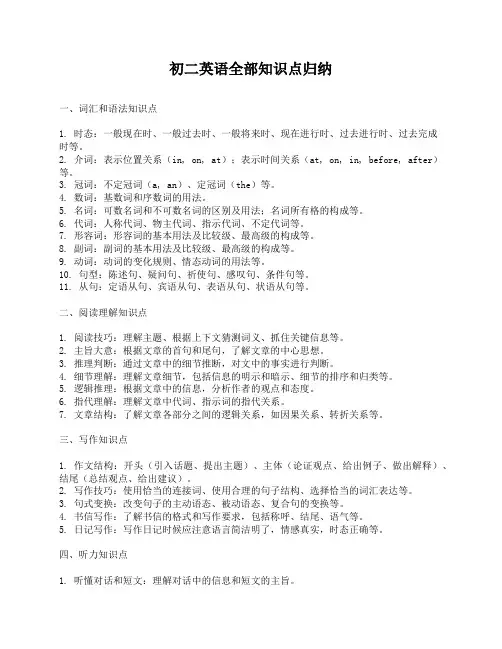
初二英语全部知识点归纳一、词汇和语法知识点1. 时态:一般现在时、一般过去时、一般将来时、现在进行时、过去进行时、过去完成时等。
2. 介词:表示位置关系(in, on, at);表示时间关系(at, on, in, before, after)等。
3. 冠词:不定冠词(a, an)、定冠词(the)等。
4. 数词:基数词和序数词的用法。
5. 名词:可数名词和不可数名词的区别及用法;名词所有格的构成等。
6. 代词:人称代词、物主代词、指示代词、不定代词等。
7. 形容词:形容词的基本用法及比较级、最高级的构成等。
8. 副词:副词的基本用法及比较级、最高级的构成等。
9. 动词:动词的变化规则、情态动词的用法等。
10. 句型:陈述句、疑问句、祈使句、感叹句、条件句等。
11. 从句:定语从句、宾语从句、表语从句、状语从句等。
二、阅读理解知识点1. 阅读技巧:理解主题、根据上下文猜测词义、抓住关键信息等。
2. 主旨大意:根据文章的首句和尾句,了解文章的中心思想。
3. 推理判断:通过文章中的细节推断,对文中的事实进行判断。
4. 细节理解:理解文章细节,包括信息的明示和暗示、细节的排序和归类等。
5. 逻辑推理:根据文章中的信息,分析作者的观点和态度。
6. 指代理解:理解文章中代词、指示词的指代关系。
7. 文章结构:了解文章各部分之间的逻辑关系,如因果关系、转折关系等。
三、写作知识点1. 作文结构:开头(引入话题、提出主题)、主体(论证观点、给出例子、做出解释)、结尾(总结观点、给出建议)。
2. 写作技巧:使用恰当的连接词、使用合理的句子结构、选择恰当的词汇表达等。
3. 句式变换:改变句子的主动语态、被动语态、复合句的变换等。
4. 书信写作:了解书信的格式和写作要求,包括称呼、结尾、语气等。
5. 日记写作:写作日记时候应注意语言简洁明了,情感真实,时态正确等。
四、听力知识点1. 听懂对话和短文:理解对话中的信息和短文的主旨。
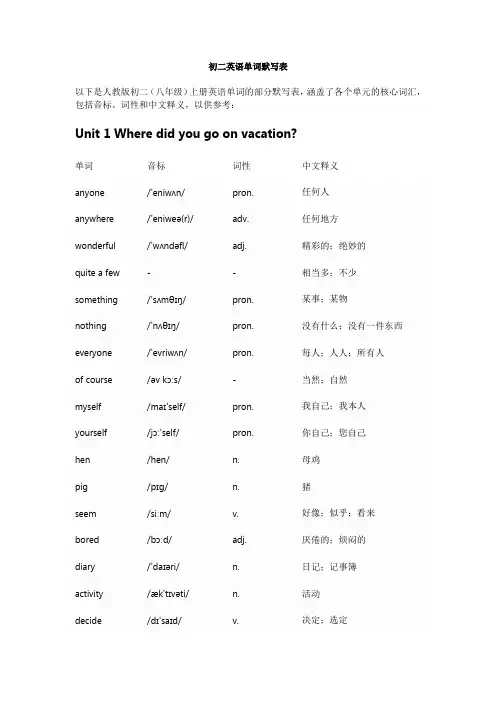
初二英语单词默写表以下是人教版初二(八年级)上册英语单词的部分默写表,涵盖了各个单元的核心词汇,包括音标、词性和中文释义,以供参考:Unit 1 Where did you go on vacation?单词音标词性中文释义anyone /'eniwʌn/ pron. 任何人anywhere /'eniweə(r)/ adv. 任何地方wonderful /'wʌndəfl/ adj. 精彩的;绝妙的quite a few - - 相当多;不少something /'sʌmθɪŋ/pron. 某事;某物nothing /'nʌθɪŋ/pron. 没有什么;没有一件东西everyone /'evriwʌn/ pron. 每人;人人;所有人of course /əv kɔːs/- 当然;自然myself /maɪ'self/ pron. 我自己;我本人yourself /jɔː'self/pron. 你自己;您自己hen /hen/ n. 母鸡pig /pɪg/ n. 猪seem /siːm/v. 好像;似乎;看来bored /bɔːd/ adj. 厌倦的;烦闷的diary /'daɪəri/ n. 日记;记事簿activity /æk'tɪvəti/ n. 活动decide /dɪ'saɪd/ v. 决定;选定paragliding /'pærəɡlaɪdɪŋ/n. 滑翔伞运动bird /bɜːd/n. 鸟bicycle /'baɪsɪkl/ n. 自行车;脚踏车building /'bɪldɪŋ/n. 建筑物;房子trader /'treɪdə(r)/ n. 商人difference /'dɪfrəns/ n. 差别;差异top /tɒp/ n. 顶部;表面wait /weɪt/ v. 等待;等候umbrella /ʌm'brelə/ n. 伞;雨伞wet /wet/ adj. 湿的;潮湿的;下雨的below /bɪ'ləʊ/ prep. &adv. 在……下面;到……下面enough /ɪ'nʌf/ adj. 足够的;充足的;充分的hungry /'hʌŋɡri/adj. 饥饿的hill /hɪl/ n. 小山;山丘duck /dʌk/ n. 鸭dislike /dɪs'laɪk/ v. & n. 不喜爱(的事物);厌恶(的事物)Unit 2 How often do you exercise?单词音标词性中文释义housework /'haʊswɜːk/n. 家务劳动;家务事hardly /'hɑːdli/adv. 几乎不;几乎没有ever /'evə(r)/ adv. 在任何时候;从来;曾经- - 几乎从不hardlyeveronce /wʌns/ adv. 一次;曾经twice /twaɪs/ adv. 两次;两倍Internet /'ɪntənet/ n. (国际)互联网;因特网program /'prəʊɡræm/ n.节目(= programme)full /fʊl/ adj. 忙的;满的;充满的swing /swɪŋ/n. & v. 摆动;秋千;(使)摆动;摇摆maybe /'meɪbiː/adv. 大概;或许;可能least /liːst/adj. 最小的;最少的at least - - 至少;不少于;起码junk /dʒʌŋk/n. 无用的东西;无价值的东西junk food - - 垃圾食品coffee /'kɒfi/ n. 咖啡health /helθ/n. 健康;人的身体(或精神)状态result /rɪ'zʌlt/ n. 结果;后果percent /pə'sent/ n.百分之……(= per cent)online /ˌɒn'laɪn/ adj. & 在线(的);联网(的)adv.television /'telɪvɪʒn/ n. 电视节目;电视机although /ɔːl'ðəʊ/ conj. 虽然;尽管;即使through /θruː/prep. 以;凭借;穿过mind /maɪnd/ n. & v. 头脑;心智;介意;对(某事)烦恼body /'bɒdi/ n. 身体together /tə'ɡeðə(r)/adv. 在一起;共同die /daɪ/ v. 消失;灭亡;死亡writer /'raɪtə(r)/ n. 作者;作家dentist /'dentɪst/ n. 牙科医生magazine /ˌmæɡə'ziːn/n. 杂志;期刊however /haʊ'evə(r)/ adv. 然而;不过than /ðæn/ conj. (用以引出比较的第二部分)比almost /'ɔːlməʊst/ adv. 几乎;差不多none /nʌn/ pron. 没有一个;毫无less /les/ adj. 较少;较小less than - - 少于point /pɔɪnt/ n. & v. 得分;点;指;指向请注意,以上只是部分单元的部分单词默写表,且具体单词和课文内容可能会因教材版本的不同而有所差异。
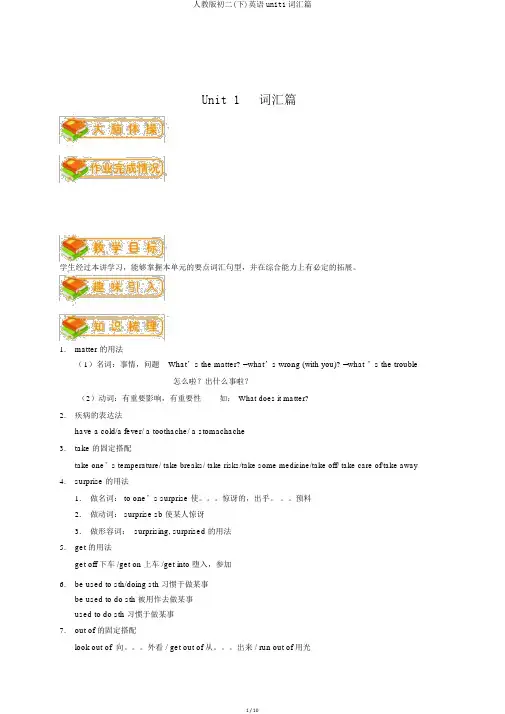
Unit 1 词汇篇__________________________________________________________________________________ __________________________________________________________________________________学生经过本讲学习,能够掌握本单元的要点词汇句型,并在综合能力上有必定的拓展。
1.matter 的用法(1)名词:事情,问题 What’s the matter? =what’s wrong (with you)? =what ’s the trouble怎么啦?出什么事啦?(2)动词:有重要影响,有重要性如:What does it matter?2.疾病的表达法have a cold/a fever/ a toothache/ a stomachache3.take 的固定搭配take one’s temperature/ take breaks/ take risks/take some medicine/take off/ take care of/take away 4.surprise 的用法1.做名词: to one’s surprise 使。
惊讶的,出乎。
预料2.做动词: surprise sb 使某人惊讶3.做形容词: surprising, surprised 的用法5.get 的用法get off 下车 /get on 上车 /get into 堕入,参加6.be used to sth/doing sth 习惯于做某事be used to do sth 被用作去做某事used to do sth 习惯于做某事7.out of 的固定搭配look out of 向。
外看 / get out of 从。
出来 / run out of 用光1. --- I'm afraid no one will agree with you.--- I don't think it .A. mattersB. mindsC. worksD. takes2. --- You'd better hurry. We'll be late for the plane.--- Don't worry. The plane will in two hours.A. take outB. take awayC. take off3. --- Why not tell her the good news right now?--- Oh, no. I want to her.A. surpriseB. callC. findD. help4. As soon as he the bus, the poor man realized he had left his wallet on it.A. got onB. got offC. got toD. got in5. Her mother is used to a rest after lunch.A. hasB. haveC. hadD. having基础操练1.---What’ s wrong ______you?---I fell off the bike and hurt my leg.2.Tom and Jenny enjoyed _________playing computer games.A. himselfB. herselfC. ourselvesD. themselves3.Sally became interested ___________science and wanted to be a scientist.4.---I had a __________.---You’ d better go to see a dentist.A. headacheB. feverC. coldD. toothache5. I didn ’ t _________my erature,temp but I knew I had a fever.A. giveB. setC. takeD. show6. They agreed __________to a picnic on a sunny day.A. wentB. goingC. to goD. go7. They are used to _________classical music and it made them feel relaxed.A. listenB. listen toC. listeningD. listening to8. ---______________---I have a fever.A. How are you doing?B. Are you all right?C. What ’ s the matter with you?D. Do you have a fever?9.We will go camping if it _________tomorrow.A. won’ t rainB. doesn ’ t rainC. isn’ t rainingD. didn’ t rain10.--- I had a bad cold.---_________________.A. That sounds greatB. Good ideaC. Thank youD. I’ m sorry to hear that11.—Oh, dear! Where is my mobile phone?— There is one in the lost and found box. Is it____________?A. youB. yourC. yoursD. mine12. Nelson Mandela was born ______________ South Africa_________________18th July, 1918.A. in, inB. in, onC. on, onD. on, in13. This bed is too hard. I feel very ______________in it.A. warmB. interestingC. comfortableD. uncomfortable14. We have a big house ____________ two living rooms and four bedroomsA. byB. withC. atD. without15. There are about two __________ students in the newly built school.A. thousandB. thousandsC. thousand ofD. thousands of( 11-15 为北京市西城区初一期末考试题)稳固提升一、单项选择1. He was badly ill, but he kept on ______until 2:00 a.m.A. workB. workingC. workedD. to work2. My pocket money ____________, so I wanted to find a part-time job to get more money.A. ran outB. went outC. got outD. ran away3. Do you know the man _______is talking with the teacher?A. whichB. whoseC. whoD. whom4. If you don ’ t _______, your dream can come true one day.A. give awayB. give upC. give outD. give off5. The problem is _______difficult that nobody can work it out.A. suchB. veryC. soD. pretty6. David made a ________that he was going to study abroad.A. mistakeB. decisionC. sentenceD. advice7. There are so many people on the bus. I don ’ t th i nkt. I canA. get outB. get awayC. get onD. get together8. The doctor advised my father to _______smoking.A. get up B .stay up C .put up D. give up9.—— What kind of person do you prefer to make friends with? —— I choose my friends on their characters and how we_______.A. get inB. get upC. get onD. get off10. When your money_________, please come to me for help.A. runs outB. is run out ofC. runs out ofD. was run out of二、依据汉语意思翻译句子。
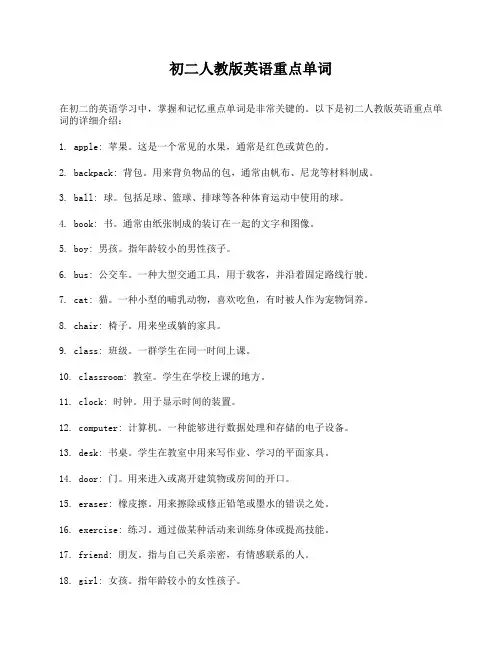
初二人教版英语重点单词在初二的英语学习中,掌握和记忆重点单词是非常关键的。
以下是初二人教版英语重点单词的详细介绍:1. apple: 苹果。
这是一个常见的水果,通常是红色或黄色的。
2. backpack: 背包。
用来背负物品的包,通常由帆布、尼龙等材料制成。
3. ball: 球。
包括足球、篮球、排球等各种体育运动中使用的球。
4. book: 书。
通常由纸张制成的装订在一起的文字和图像。
5. boy: 男孩。
指年龄较小的男性孩子。
6. bus: 公交车。
一种大型交通工具,用于载客,并沿着固定路线行驶。
7. cat: 猫。
一种小型的哺乳动物,喜欢吃鱼,有时被人作为宠物饲养。
8. chair: 椅子。
用来坐或躺的家具。
9. class: 班级。
一群学生在同一时间上课。
10. classroom: 教室。
学生在学校上课的地方。
11. clock: 时钟。
用于显示时间的装置。
12. computer: 计算机。
一种能够进行数据处理和存储的电子设备。
13. desk: 书桌。
学生在教室中用来写作业、学习的平面家具。
14. door: 门。
用来进入或离开建筑物或房间的开口。
15. eraser: 橡皮擦。
用来擦除或修正铅笔或墨水的错误之处。
16. exercise: 练习。
通过做某种活动来训练身体或提高技能。
17. friend: 朋友。
指与自己关系亲密,有情感联系的人。
18. girl: 女孩。
指年龄较小的女性孩子。
19. grade: 年级。
指学校中按照年龄划分的不同层次。
20. hat: 帽子。
用于保护头部或作为装饰物的头部覆盖物。
21. key: 钥匙。
用于打开或关闭锁的金属制品。
22. library: 图书馆。
存放书籍和其他媒体资料的地方。
23. map: 地图。
用来表示地理位置或路径的图形。
24. math: 数学。
一门研究数量、结构、变化和空间等概念的学科。
25. music: 音乐。
一种通过声音和节奏来表达情感和创造力的艺术形式。
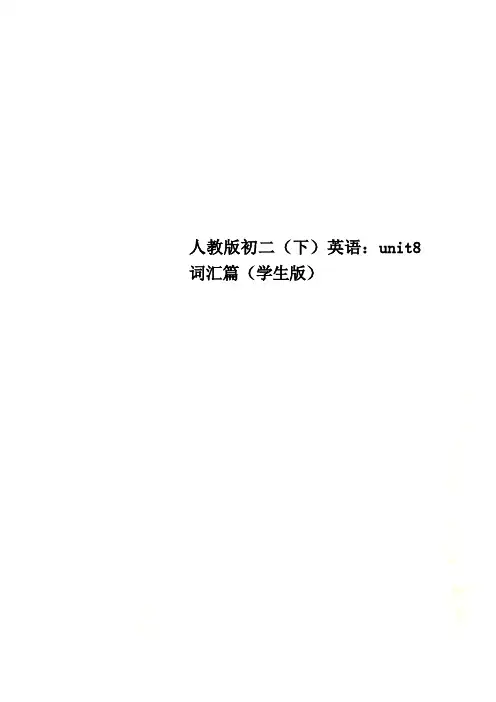
人教版初二(下)英语:unit8词汇篇(学生版)Succeed: 成功,动词词性Successful:成功的,形容词词性Successfully:成功地,副词词性1. A beginning will lead toa in the end. I hope youwill in your English exam.A. success; successful; succeedB. successfully; succeed; successC. successful; succeed; successD. successful; success; succeed2. 这件红色的衬衫是她的吗?this redblouse her?3. 校长已经向我们介绍新英语老师了。
The headteacher the new English teacher us.4. 《汤姆·索亚历险记》是一个充满乐趣的生动的故事。
The Adventure of Tom Sawyer is a livelystory.5. 快点,否则你上学就要迟到了!, or you'll be late for school!基础演练1. --- Have you ever been to Disneyland?--- No, . I hope I can go there next year.A.always B.sometimesC. neverD. often2. Jack dislike the weather in Beijing in spring, because there is so much wind and sand. But now he it.A. is used to; used toB. used to; is used toC. was used to; is usedtoD. used to; uses to3. The woman who is talking with Mr.Brown be Miss Li. She has gone to England.A. can'tB. mustC. mayD.mustn't 4. --- Your English is good.--- Thank you. I it for three years.A. learnB.learned C. havelearnedD. hadlearned5. The government of Linyi isbuilding cheap and good houses for the people.A. thousand B. thousandsC. thousand ofD. thousands of6. Yao Ming was famous playing basketball.A. toB. asC. forD.between 7. --- What do you think of Sanya?--- Oh, it's a beautiful city,I there for several times.A. havebeen B. havebeen toC. havegone toD. havebeen in8. My mother us stories when we were children.A. was used to tellB. is used to tellingC. used to tellD. used to telling9. I was in the US, I made a lot of American friends.A. WhileB.AlthoughC. UnlessD. Until10. I have seen such a beautiful village anywhere in the world.A. everB. neverC. stillD. hardly11. That man be my English teacher. He has gone to Canada.A.needn't B.mustn'tC. can'tD.shouldn't12. The man tried several times to start the car, and he succeeded .A. in thepast B. in theendC. at firstD. at once13. --- I've never had such a wonderful time. Thank you for inviting me.A. That's right.B. You're welcome.C. That's it.D. Good job.14. Do you know that the earth is hometo animals?A. millionB.millions C. millionofD.millionsof巩固提高1. (快点), or we will not catch the early bus. (词数不限)2. The book is so interesting that Icouldn't it (放下).3. Last summer holiday I picked up a lot of colorful shells (在沙子里). (词数不限)4. There are (至少) 5 words in this sentence. (词数不限)5. (多久) have you been an engineer? (词数不限)6. The noisy music is (一个醒来的好方法). (词数不限)7. Tom and his parents often (争吵) small things. (词数不限)8. The song (充满感情的) reminds me of my old father in the mountain village.(词数不限)9. As time went on, he (逐渐意识到) his mother's love to him. (词数不限)10. The boy took part in manyclubs, (例如) singing club and basketball club.(词数不限)11. Can you tell me (…的数量) the students in your class? (词数不限)12. They have finished fivetasks (在一天结束的时候). (词数不限)一、单项选择1. --- Are these books yours, Mike?--- No, they aren't. They belongto .A. himB. hisC. hersD. she2. There are soccer fans in the world.A. millionB. three millionsC. million ofD. millions of3. --- Hello! Could I speak to Lily?--- Sorry, she is not in.She Shanghai.A. havebeen to B. havegone toC. hasbeen toD. hasgone to4. Liu Huan is a famous singer, butCindy to any of his songs yet.A. listenB. doesn't listenC. has listenedD. hasn't listened5. --- MissBrown out all of her records? --- No, not yet.A. Have;sold B. Has;soldC. Does;sellD. Is; sell6. People often use it ships.A. buildB. buildsC. tobuild D.building7. --- Lily, why are you still here? School is over for half an hour.--- Because I my task yet. I still need one more hour.A. won't finishB. didn't finishC. haven't finishedD. hadn't finished8. When they arrived the island, they were all attracted by its beauty.A. atB. inC. onD. to9. --- Hurry up, you will be late for school.--- OK. I'm coming.A. andB. butC. orD. so10. --- Mr. Li, I can't understand everything in class.--- Don't worry! I'll the main points at the end.A.record B.receiveC.requireD.remember二、完形填空It was my first day at Grade 6. And the first lesson was 11 English. When I was doing nothing, Mr. Gough, our new English teacher, 12 into the classroom.To my surprise, he held up a book, The Collected Works of Edgar Allen Poe, and asked if anyone13 it. I put my hand up, because Poe was my favorite writer. Mr. Gough asked if I really understood 14 the author tried to say in his book. My reply made him smile, and he asked me 15 an essay on that subject.After that, English classes became a new interest for me. Mr. Gough thought that students had to 16 a play to understand it. "Don't just read it," he said.As time passed, we developed a real friendship. He encouraged me to be a 17 in the future. When I left school, he said to me, "You have a gift for writing, Tony, and one day you'll come to realize how 18 it is. Make use of it if you want your life to be complete."19 have passed. Now, every time I sit down to write 20 , I think of Mr. Gough. He was more than just an English teacher, because he also taught me useful lessons in life.11 . A. boringB.bored C. interestingD. interested12 . A.walks B.walked C.waswalkingD.iswalking13 . A.reads B.read C.hasreadD.hadread14 . A.if B.when C.what D.how15 . A.wrote B.writing C.to write D.written16A work B act out C put out D come. . out . . . out17 . A. teacherB.actor C.waiter D.writer18 . A.useful B. beautifulC.careful D. thankful19 . A.AyearB.SomeyearC.Years D.Everyyear20 . A. anything newB. something newC.newanythingD.newsomething____________________________________________ _________________________________________________________________________________ _____________________________________一、单项选择(江苏省苏州市工业园区初二下期中考试)1. Li Na plays tennis very well. She has become first Asian woman to reach a Grand Slam (大满贯) final.A. a; theB. /; theC. the; aD. /; a2. Last week I a cold. Since last week, I a cold.A. have had; have hadB. caught; have hadC. have had; havecaught D. caught; havecaught3. The CD-ROM which has eight floors last night.A. wascomeout B. wascameoutC. cameoutD. is comeout4. The character in this filmis boy.A. an 11-year-oldB. an 11 years oldC. a 11-year-oldD. a 11-year old5. It is impolite for students in class. They must listen to the teacher carefully.A. to be sleepB. to fall sleepC. to sleepingD. to fall asleep6. I hope my father ask me about my marks after every exam.A. notB. not toC. won'tD. don't7. --- Have you finished yourhomework ?--- Not . I was playing computer games.A. yet;already B.already;yetC. yet; yetD. yet;ever8. The farewell party with the song loved by all the students there.A. beginsB. wasbegun C. began D. isbeginning9. The changes the environment have brought many benefits.A. toB. ofC. forD. on10. I must say that it's the best modelI .A. sawB. seeC. haveseenD. will see11. We do believe green house effectdoes to our environment.A.harmful B.harmlessC. harmD. harms12. My parents twenty years ago. They for twenty years. We willcelebrate their twenty yearsof this Sunday.A. have been married; got married; marriedB. got married; have been married; marriageC. got married; have been married; marriedD. have got married; were married; marriage13. This kind of pens out in this shop, because they well.A. sells; are writtenB. is sold; writeC. are sold; arewrittenD. sells; write14. This book three main stories, and every story has a surprising ending.A.including B.includesC.includeD. isincluded15. --- I'm too nervous to give a talk in front of so many people.--- , Lucy. You can do it.A. Comeon B. That'sgreatC. You'rerightD. That'strue二、完形填空Like many other girls who are 17 years old, Maria Sharapova likes to go shopping, talk with friends and read Harry Potter Books. But she is very different 16 some ways.The Russian tennis player is one of the richest sportswomen in the world.She can 17 100 million dollarsa year. This year Sharapova has not only18 five big games but also been19 lots of fashion magazines. Will she let money and fame(名声) 20 the way she lives?"I know things will come up, and I21 to keep my head cool. I leave business for other people. I just want to go out and play tennis," she said. Sharapova has strict22 for herself. When she is not playing games, she usually practices for two hours each day 23 she stays fit.She goes to school using the Internet. Her mother 24 her textbooks into pieces, so she doesn't have to25 many pages with her. She takes just three courses a year, doing homework a few times a week."I'm not really in a hurry," she said, "I've always been learning by myself."16 . A.in B.on C.at D.by17 . A.make B.run C.hold D.set18 . A.got B. ownedC.won D. received19 . A.in B.on C.at D.of20 . A.fill B.fix C.stop D.change21 . A.want B.like C.try D.have22 . A. programB.plan C. practiceD.way23A if B so C D but. . . . because .24 . A.breaks B.cuts C. knocksD.hits25 . A.bring B.leave C.take D.keep三、阅读理解AThere are four parts in IELTS: listening, speaking, reading and writing. Listening is very important. Are you confident? Have you made good preparation? The book IELTS Listening is helpful for your preparation for IELTS.Car and Driver is the world's most popular automotive magazine. It provides information and entertainment for people who like cars. It offers the best vehicle tests in the business. The magazine alsocovers the latest developments incar technology.Once you own the book, you will become a good speaker. Susan Weinschenk's excellent ideas on how to make a perfect speech are very helpful to you. With the help of the book, you will be confident to know how to give your speech. Also, you will learn how to attract your audience during the speech.The book offers healthy and delicious food. These dishes can all be completed in less than half an hour, and in many cases, in just a few minutes. Sisson and Meier show you how to delight your family or guests every time with quick, delicious meals using local materials, meats, healthy fats (yes, and real butter) andcommon herbs and spices.26. Which of the following will help to improve your speech?A. IELTS Listening.B. Car and Driver.C. Quick & Easy Meals.D. Designing Effective Speech Interfaces.27. Who will probably be interested in Quick & Easy Meals?A. Car fans.B. English speakers.C. Housewives.D. Businessmen.28. How many of the four short passages are introductions of magazines?A. One.B. Two.C. Three.D. Four.BSongkran is a time for cleaning, symbolized(象征) by the throwing of water. Songkran starts on April 13 every year and lasts for three days. We call it "Thai New Year".Thai New Year is a good time for all children to show how much love they have for their parents. In this holiday children give flowers to their parents and then pour some water to their parents and thenpour some water on their parents' hands. Songkran is also known as the "Water Festival" because people believe water will wash bad luck away.At that time people usually return home to visit their families and spend time together. People also do many fun things. For example, they joyfullysplash(泼) water on each other, watch the Miss Songkran Contest. And some spend their holiday relaxing at travel spots. All of Thailand is full of travelers and their families to enjoy the water festival.29. Thai New Year finishes on .A. April12 B. April13C. April14D. April1530. Children pour some water on their parents' hands because .A. their parents' hands are very dirtyB. they love their mother very muchC. their parents enjoy the Water FestivalD. they believe water will wash bad luck away31. Which of the following is not mentioned in the article?A. Songkran is a holiday for Thai people.B. Children give flowers to their parents forthis holiday.C. People also pour milk on others in thisholiday.D. Songkran is a holiday for children to showtheir love to their parents.32. In Thailand, peopleusually during the New Year.B. relax at travel spots A. go to visit theirfamiliesD. A and BC. work hard in thecityCA passenger(旅客) told an air hostess that he needed a cup of water to take his medicine when the plane just took off. She told him that she would bring him the water in ten minutes.The air hostess was kept so busy that she forgot to give him the water. As a result, the passenger was held up (延误) to take his medicine. Thirty minutes later, when the passenger's ring forservice sounded, she hurried over to him with a cup of water, but he refused.In the following hours on the plane, each time the air hostess passed by the passenger, she would ask him with a smile whether he needed help or not. But the passenger never answered a word.When he was going to get off the plane, the passenger asked the air hostess to hand him the passengers' booklet(小册子). She was very sad. She knew that he would write down sharp words, but with a smile she handed it to him.Off the plane, she opened the booklet, and smiled, for the passenger put it:"On the flight, you asked me whether I needed help or not for twelve times in all. How can I refuse your twelve sincere smiles?"That's right! Who can refuse twelve sincere smiles from a person?33. Ten minutes later, the passenger didn't get the water because .A. the plane didn't take offB. the air hostess was kept busy and forgot itC. it wasn't allowed to take medicine during theflightD. there wasn't enough water on the plane34. The underlined word "it in Paragraph 4 refers to (指的是) the .A.medicine B. water C. cup D.booklet35. At last the passenger was .A. satisfied with the air hostessB. unhappy with the air hostessC. angry at what the air hostess had saidD. too tired to blame the air hostessDFarmer John and farmer Bob were neighbours. For more than 30 years, they had been getting along very well.Then their good relationship(关系) broke. It began with a small thing, then bitter(尖刻的) words, and then weeks of silence. One morning farmer John woke up to find a stream(水沟) between the two farms. "It must be Bob," John thought.Then one day there was a knock on John's door. He opened it to find a carpenter(木匠) standing at the doorway."I'm looking for a few days' work," the carpenter said."I do have a job for you," John said, "Look across the stream at that farm. That's my neighbour Bob. He dug(挖) a stream between the two farms. I want you to build a fence(篱笆)—an 8-foot fence. I don't want to see his place or his face any more. I don't have such a neighbour."The carpenter said, "I think I know what to do, sir, and I'll be able to do a job that pleases you."Farmer John helped the carpenter get materials ready and then he was off for the day.About sunset when the farmer returned, the carpenter had just finished his job. The farmer's eyes opened wide. There was no fence there at all!It was a bridge! And the neighbour, Bob, was coming across, with his hand out-stretched(伸出), "Hi, John! You're quite a fellow to build thisbridge!"Then they met in the middle, taking each other's hands. "I'm terribly sorry for what I have said and done. We should be good to each other," said farmer Bob.Then they turned to see the carpenter, who was ready to go. No, wait! Stay a few days. I have a lot of other jobs for you," said farmer John. "I'd love to stay," the carpenter said, "but I have more bridges to build."36. Just before the carpenter came, John andBob each other for weeks.A. hadn't spoken toB. were friendly toC. had fought withD. had bitter wordswith37. Farmer John asked the carpenter to build a fence because .A. he wanted to protect his farmB. he didn't want to do it himselfC. he wouldn't like to see BobD. he wanted to find him something to do38. Who built the bridge over the steam between Bob's and John's?A. The carpenter.B. Bob.C. John.D. John's friend.39. What does the sentence "You're quite a fellow to build this bridge!" mean?A. John was good at building bridges.B. John was great to build this bridge.C. John was silly to build such a bridge.D. John should build the bridge earlier.40. What do you think will happen in the end?A. The carpenter will stay to do other jobs.B. Farmers Bob and John will build morebridges.C. The two farmers will build a fencethemselves.D. Farmers Bob and John will make friendsagain.。
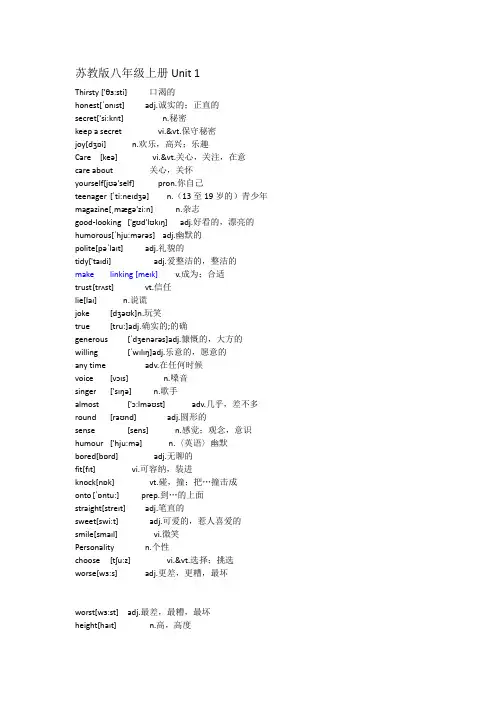
苏教版八年级上册Unit 1Thirsty ['θɜːsti]口渴的honest[ˈɒnɪst] adj.诚实的;正直的secret['siːkrɪt] n.秘密keep a secret vi.&vt.保守秘密joy[dʒɒi] n.欢乐,高兴;乐趣Care [keə] vi.&vt.关心,关注,在意care about 关心,关怀yourself[jʊə'self] pron.你自己teenager [ˈtiːneɪdʒə] n.(13至19岁的)青少年magazine[ˌmægə'ziːn]n.杂志good-looking ['gʊd'lʊkɪŋ]adj.好看的,漂亮的humorous[ˈhjuːmərəs] adj.幽默的polite[pəˈlaɪt] adj.礼貌的tidy['taɪdi] adj.爱整洁的,整洁的make linking [meɪk] v.成为;合适trust [trʌst] vt.信任lie[laɪ] n.说谎joke [dʒəʊk]n.玩笑true [truː]adj.确实的;的确generous [ˈdʒenərəs]adj.慷慨的,大方的willing [ˈwɪlɪŋ]adj.乐意的,愿意的any time adv.在任何时候voice [vɔɪs] n.嗓音singer ['sɪŋə] n.歌手almost ['ɔːlməʊst] adv.几乎,差不多round [raʊnd] adj.圆形的sense [sens] n.感觉;观念,意识humour ['hjuːmə] n.〈英语〉幽默bored[bɒrd] adj.无聊的fit[fɪt] vi.可容纳,装进knock[nɒk] vt.碰,撞;把…撞击成onto [ˈɒntuː]prep.到…的上面straight[streɪt] adj.笔直的sweet[swiːt]adj.可爱的,惹人喜爱的smile[smaɪl] vi.微笑Personality n.个性choose [tʃuːz]vi.&vt.选择;挑选worse[wɜːs]adj.更差,更糟,最坏worst[wɜːst]adj.最差,最糟,最坏height[haɪt] n.高,高度weight[weɪt] n.重量sec. (=second) abbr.秒competition[ˌkɒmpɪˈtɪʃən] n.竞赛,比赛;竞争test [test] n.测试,考查Swimmer n.游泳者plan [plæn] n.打算,计划social[ˈsəʊʃ(ə)l] adj.社会的social worker n.社会工作者Ponytail n.马尾辫shy[ʃaɪ] adj.害羞的square adj.方形的[skweə]smiling 微笑的,带着笑意的handsome[ˈhænsəm] adj.英俊的fat [fæt] adj.胖的hard-working 勤奋的,工作努力的patient['peɪʃənt] adj.耐心的smile[smaɪl] vi.微笑unhappy [ʌnˈfɔːtjʊnətli] adj.不快乐的,悲伤的excellent ['eksələnt] adj.杰出的,极好的Unit 2advertisement (=ad)广告[ədˈvɜːtɪsmənt] British adj.英国的['brɪtɪʃ]biscuit n.〈英〉饼干[ˈbɪskɪt]lorry n.〈英〉卡车[ˈlɒri]rubber n.〈英〉橡皮[ˈrʌbə]American adj.美国的[ə'merɪkən]eraser n.〈美〉橡皮 [ɪ'reɪsə]soccer n.〈美〉英式足球[ˈsɒkə]vacation n.〈美〉假期 [vəˈkeɪʃ(ə)n]cookie n.〈美〉饼干 ['kʊki]fall n.〈美〉秋天 [fɔːl]store n.〈美〉商店 [stɔː]truck n.〈美〉卡车 [trʌk]yard n.〈美〉院子 [jɑːd]movie n.〈美〉电影[ˈmuːvi]mixed adj.男女混合的;混合的French n.法语[frentʃ]foreign adj.外国的[ˈfɒrɪn]language n.语言['læŋgwɪdʒ]during prep.在…期间['djʊərɪŋ]discuss vt.讨论,议论[dɪ'skʌs]in class 在课堂上guy n.〈口〉家伙 [gaɪ]buddy n.〈口〉好朋友;搭档 ['bʌdi] offer v t.主动提出,自愿给予['ɔːfə]end vi.&vt.结束[end]baseball n.棒球['beɪsˌbɔːl]win vi.&vt.赢得;赢,获胜 [wɪn]least a dj.最少的;最小的[liːst]further (far的比较级)较远[ˈfɜːðə] farther (far的比较级)较远['fɑːðə] furthest (far的最高级)最远farthest (far的最高级)最远['fɑːðɪst] spend vt.花费(时间或金钱)[spend] spend time on/doing sth. 花时间做某事uniform n.制服[ˈjuːnɪfɔːm]chess n.国际象棋[tʃes]at most 最多daily a dj.每日的,日常的[ˈdeɪli]weekly adj.每周的[ˈwiːkli]quick adj.快的[kwɪk]through prep.自始至终,从头到尾[θruː] look through 浏览,快速查看real adj.真实的,真的['riːəl]at first 起初,首先keep (on) doing sth 继续,重复做某事finish vi.&vt.完成;结束 ['fɪnɪʃ] lunchtime n.午餐时间physics n.物理(学) ['fɪzɪks]badminton n.羽毛球[ˈbædmɪntən]ideal a dj.理想的[aɪˈdɪəl]Unit 3come on 来吧;赶快[ˈkʌmɒn]ourselves pron.我们自己[ˌaʊə'selvz] enjoy oneself 玩得愉快[ɪn'dʒɔɪwʌnˌself] Australia n.澳大利亚[ɔːs'treɪlɪə]take care 保重coffee n.咖啡[ˈkɒfi]top n.顶部,(物体的)上面[tɒp] president n.总统,国家主席[ˈprezɪdənt] wide a dj.…宽的;宽广的[waɪd]steel n.钢[stiːl]ton n.吨 [təˈmɒrəʊ]fine adv.够好,蛮不错[faɪn]join vt.&vi.加入,参加 [dʒɔɪn]myself pron.我自己[maɪ'self]shine vi.照耀,发光[ʃaɪn]clear a dj.晴朗的,清晰的[klɪə]sky n.天,天空[skaɪ]journey n.旅行,旅程 ['dʒɜːni]boring adj.乏味的['bɔːrɪŋ]finally adv.最后['faɪnəli]arrive vi.到达[ə'raɪv]arrive at/in 到达can't wait 迫不及待get off 下车[ˈgetɒf]interest n.令人感兴趣的事(或人) ['ɪntərɪst] place of interest n.景点not believe one's eyes 不相信自己眼睛,非常惊讶main adj.主要的[meɪn]sights[ 复]名胜,风景culture n.文化[ˈkʌltʃə]Internet n.网络['ɪntəˌnet]page n.页,页面,页码 [peɪdʒ]home page n.主页yourselves pron.你们自己[jɔː'sɛlvz] themselves pron.他们自己[ðəm'selvz]by oneself 独立地,独自itself p ron.它自己[ɪtˈself]pull vt.&vi.拉;拖;移开[pʊl]rock n.岩石[rɒk]luckily adv.幸好,幸运的是['lʌkɪli]climber n.登山者,攀爬者final n.决赛['faɪnl]support n.支持[səˈpɔːt]take place 进行,发生[teɪk//pleɪs]cheer vi.&vt.欢呼,喝彩 [tʃɪə]reach vt.到达[riːtʃ]half-time n.中场休息get on 上车[ˈgetɒn]cost n.费用,价钱 [kɒst]rest vi.休息,歇息[rest]free adj.免费的[friː]helpless adj.无助的useful adj.有用的,有益的['juːsfəl] useless adj.无用的[ˈjuːslɪs]cheer vi.&vt.欢呼,喝彩 [tʃɪə]hope n.希望[həʊp]meaning n.意思['miːnɪŋ]taste n.味道;品味 [teɪst]cheerful adj.兴高采烈的[ˈtʃɪəfʊl] colourful adj.多彩的['kʌləfəl]ticket n.票,入场劵 ['tɪkɪt]keep v t.留着,不退还[kiːp]square n.广场[skweə]Unit 4instruction n.指示[ɪn'strʌkʃən]had better (='d better)最好tool n.工具[tuːl]brush n.刷子;画笔 [brʌʃ]glue n.胶水[ɡluː]rope n.绳索[rəʊp]scissors n.[复]剪刀['sɪzəz]tape n.磁带;胶带 [teɪp]DIY n.自己动手做exactly adv.确切地,精确地[ɪg'zæktli] stand for 代表;象征repair vt.修补[rɪ'peə]decorate vt.装饰['dekəreɪt]instead of 而不是,代替[ɪn'stedəv] rose n.玫瑰(花) [rəʊz]crazy adj.着迷的,狂热的,发疯的[ˈkreɪzi] be crazy about 对…着迷terrible adj.可怕的['terəbl]once a dv.曾经,一度[wʌns]put in 安装,使...在内,放进mistake n.错误,失误 [mɪ'steɪk]make a mistake 犯错误[ˌmeɪkə mɪs 'teɪk] power cut n.供电中断,停电pipe n.管子,水管 [paɪp]fill vt.使充满[fɪl]fill ... With ... 用……填充……not only ... but (also) 不仅…而且…,…和…都ceiling n.天花板[ˈsiːlɪŋ]shelf (pl. shelves) 架子,搁板[ʃelf] whoops 哎呀n.大叫,呐喊,喘息声advise vt.&vi.建议,忠告,劝告[ədˈvaɪz] course n.课程;过程 [kɔːs]already adv.已经[ɔːl'redi]instead adv.反而,却,代替[ɪn'sted] attend vt.&vi.经常去;出席[əˈtend]cut vt.剪下,切下,割下[kʌt]sentence n.句子[ˈsent(ə)ns]grape n.葡萄[greɪp]strawberry n.草莓[ˈstrɔːbəri]spoon n.匙,调羹[spuːn]salad n.沙拉;色拉[ˈsæləd]cream n.奶油;乳脂;霜[kriːm]mix vt.&vi.混合[mɪks]add vt.&vi.增加,补充 [æd]tip n.指示,指点 [tɪp]example n.例子;榜样 [ɪg'zɑːmpl]for example 例如[fɔː//ɪg'zɑːmpl]leave v.离开vt.使处于某种状态[liːv] sauce n.调味汁,酱 [sɔːs]ham n.火腿[hæm]correct adj.正确的[kə'rekt]finished adj.完成certain adj.确定的[ˈsɜːt(ə)n]active adj.积极的,活跃的,主动的['æktɪv] possible adj.可能的[ˈpɒsəbl]tidy vi.&vt.收拾,整理v.使整洁['taɪdi]tidy up 收拾妥,整理好secret adj.秘密的['siːkrɪt]keep it secret 保密wrong adv.错误地,不对[rɔːŋ]go wrong 弄错;犯错;(机器)出故障[ˌgəʊˈrɒŋ] spell vt.&vi.拼写[spel]cut out 剪出balloon n.气球[bəˈluːn]stick vt.&vi.粘住,钉住 [stɪk]cover n.封面;盖子,罩 ['kʌvə]complete vt.完成[kəmˈpliːt]paint n.颜料[peɪnt]furniture n.家具[ˈfɜːnɪtʃə]Unit 5wild 野生的;自然环境;野生状态[waɪld]free adj. 自由的,不手术博的[friː]dish n. 一道菜;盘,碟[dɪʃ]no way (口语)不可能pity n.同情['pɪti]have/take pity on 同情,怜悯die vi.死[daɪ]in fact 实际上,事实上(短语)[ɪn'fækt] dolphin n.海豚[ˈdɒlfɪn]giant panda n.大熊猫squirrel n.松鼠[ˈskwɪr(ə)l]zebra n.斑马[ˈzebrəˌˈziːbrə]mean vt.意思是,意味着[miːn]be born 出生,出世(短语)beginningn.开始,起初 [bɪ'gɪnɪŋ]in the beginning 开始,起初,在开始的时候sadly 令人遗憾地,不幸地,伤心地['sædli] face vt.面临,面对n.脸,面孔 [feɪs]live on 以食.....为生(短语)[lɪv//ɒn] mainly adv.主要地;大部分['meɪnli] result n.结果[rɪ'zʌlt]as a result 因此(短语)danger n.危险['deɪndʒə]in danger 处境危险(短语)action n.行动;行为[ˈækʃ(ə)n]take action 采取行动(短语)right away 立刻,马上(短语)reserve n.(动植物)保护区[rɪˈzɜːv]law n.法律,法规 [lɔː]none pron.没有一个(人或物)[nʌn]at birth 出生时,诞生时(短语)closed adj.关闭的[kləʊzd]bat n.蝙蝠[bæt]bee n.蜜蜂[biː]lost adj.迷路的,迷失的[lɒst]get lost 迷路(短语)the same...as 与……同样save vt.&vi. 储存,节省[seɪv]stripe n. 条纹,斑纹while n.一会儿,一段时间[hwaɪl] quality n.特性,才能,才能[ˈkwɒlɪti] hunter n.猎人[ˈhʌntə]catch vt.捉住,捕获[kætʃ]wolf n.狼 [wʊlf]thick a dj.厚的;密的;浓的[θɪk]lose vt.失去,被…夺去;输掉[luːz]living n.生存, 生计[ˈlɪvɪŋ]kill vt.&vi. 杀死[kɪl]human n.人,人类['hjuːmən]yours sincerely (正式信件署名前)你真诚的sorry adj.难过的,遗憾的[ˈsɒri]pity n.同情['pɪti]sell vt.&vi. 卖,出售[sel]shame n.憾事;羞愧 [ʃeɪm]act vt.&vi. 行动,表演[ækt]illness n.疾病[ˈɪlnɪs]accept vt.&vi. 接受,收受[əkˈsept]report n.报告[rɪ'pɔːt]tail n.尾巴[teɪl]insect n.昆虫[ˈɪnsekt]move vt.&vi.活动,移动,搬迁[muːv]slowly adv.缓慢地['sləʊli]daytime n.白天['deɪtaɪm]otherwise adv.要不然,否则[ˈʌðəwaɪz]Unit 6birdwatching 观鸟market 市场['mɑːkɪt]yeah <口>是的[jeə]hen 母鸡[hen]yummy <口>美味的,可口的[ˈjʌmi]crane 鹤sparrow n.麻雀[ˈspærəʊ]feather n.羽毛['feðə]swan n.天鹅[swɒn]eagle n.鹰[ˈiːɡ(ə)l]broad adj.宽的,宽大的[brɔːd]wing n.翅膀[wɪŋ]type n.种类[taɪp]rare adj.罕见的,稀有的[reə]nature n.大自然,自然界[ˈneɪtʃə]wetland (尤指为野生动物保存)湿地provide vt.提供[prə'vaɪd]cover n.庇护所,遮盖物,罩子['kʌvə] wildlife n.野生动物[ˈwaɪldlaɪf]perfect adj.极好的,完美的[kwestʃəˈneə] round adv.周围,绕一整圈[raʊnd]all year round 一年到头(短语)while conj.然而[hwaɪl]stay n.停留,逗留 [steɪ]easily adv.容易地,不费力地[ˈiːzɪli]cent n.分,分币[sent]per cent (英)百分之....in order to 以便,为的是(短语)space n.空间[speɪs]lead vt.&vi. 领导,带领[liːd]lead to 导致(短语)less and less 越来越少(短语)[les//ænd//les]moreover 此外[mɔːˈrəʊvə]fisherman n.渔民,钓鱼的人[ˈfɪʃəmən]fish vi.捕鱼,钓鱼[fɪʃ]government n.政府[ˈɡʌvənmənt]prevent vt.防止,预防[prɪ'vent]society n.协会,社会 [sə'saɪəti]record vt.记录[ˈrekɔːd]change n.改变,变化 [tʃeɪndʒ]tourist n.旅行者,观光者['tuːrɪst]count vt.&vi.计算(或清点)总数[kaʊnt] describe vt.描述[dɪ'skraɪb]understand vt.&vi. 理解,明白[ˌʌndə'stænd] importance n.重要性 [ɪmˈpɔːt(ə)ns]write down 写下,记下(短语)[raɪt//daʊn] south-east n., adj. &adv.东南方cover n.庇护所,遮盖物,罩子['kʌvə]red-crowned crane 丹顶鹤binoculars[ 复]望远镜clearly adv.清晰地['klɪəli]speaker n.说话人;演讲者['spiːkə]tour n.旅行[tʊə]application n.申请,申请表,应用 [æplɪˈkeɪʃ(ə)n] form n.表格,形状,种类,形态[fɔːm]address n.地址[ə'dres]chairperson n.主席introduce v t.介绍[ɪntrəˈdjuːs]natural adj.自然的,天然的['nætʃərəl]Unit 7bet vt.&vi. 打赌;敢说[bet]foggy adj.有雾的,多雾的[ˈfɒgi] rainyadj.有雨的['reɪni]snowy adj.有雪的[snəʊi]butterfly n.蝴蝶[ˈbʌtəflaɪ]shower n.阵雨;阵雪 ['ʃaʊə]memory n.记忆,回忆 ['meməri]stream n.小河,溪流[striːm]shade n.阴凉处,树荫处 [ʃeɪd]pile n.堆 [paɪ]upon prep.在....之上[əˈpɒn]harvest vt.&vi. 收割,收获['hɑːvɪst]crop n.庄稼,收成 [krɒp]as conj.当....时;随着[æz]temperature n.温度['temprɪtʃə]drop v t.&vi. 下降,落下[drɒp]rise vi.上升,升起[raɪz]cloud n.云 [klaʊd]kick vt.踢[kɪk]fever n.发烧[ˈfiːvə]cough vi.咳嗽[kɒf]awful adj.糟糕的,很坏的[ˈɔːfʊl] snowstorm n.暴风雪windn.风 [waɪnd]around adv.大约[ə'raʊnd]sunshine n.阳光['sʌnʃaɪn]rest n.其余部分,休息时间,其他[rest] degree n.度数,度,程度 [dɪˈɡriː]bit n.少量,一点 [bɪt]a bit 有一点(短语)[ə'bɪt]blow v t.&vi. 吹;刮[bluː]loud adv.大声地[laʊd]ring vt.&vi.给…打电话;响铃[rɪŋ]fog n.雾 [fɒg]sleepy adj.困倦的,瞌睡的[sliːp] shine n.光亮,光泽 [ʃaɪn]shiny adj.光亮的,反光的['ʃaɪni] sudden adj.突然的[ˈsʌd(ə)n] snowball n.雪球[ˈsnəʊbɔːl]fight n.打仗(架) [faɪt]deep adj.深的[diːp]frozen adj.结冰的land n.陆地[lænd]exciting adj.激动人心的[ɪk'saɪtɪŋ]throw vt.扔;投;掷[θrəʊ] scream vt.&vi. 尖叫,惊呼[skriːm] snowman n.雪人['snəʊˌmæn]ice n.冰 [aɪs]everywhere adv.到处['evrɪhweə]Unit 8disaster n.灾难;不幸,祸患[dɪˈzɑːstə] mop vt.用拖把擦干净[mɒp]up 向上,在上面,在高处,起床[ʌp] earthquake n.地震['ɜːθkweɪk] thousands of 成千上万的(短语)accident n.事故,意外的事 ['æksɪdənt] coach 长途汽车,旅客车厢,经济舱[kəʊtʃ] crash vt.&vi. 猛撞,碰撞[kræʃ]flood n.洪水;水灾 [flʌd]wash away 冲走(短语)village n.村庄,乡村 ['vɪlɪdʒ]lighting 闪电['laɪtɪŋ]storm n.风暴,暴(风)雨[stɔːm] thunder n.雷,雷声[ˈθʌndə]catch fire 着火(短语)slight adj.轻微的[slaɪt]shake n.摇动,震动 [ʃeɪk]loud adj.响亮的;大声的;喧闹的[laʊd] bomb n.炸弹[bɒm]shake n.摇动,震动 [ʃeɪk]fear n.害怕,恐惧 [fɪə]direction n.方向[dɪˈrekʃ(ə)nˌdaɪˈrekʃ(ə)n] in all directions 四面八方(短语)while conj.当.....时[hwaɪl]brick n.砖,砖块[brɪk]come down 崩塌,坍塌['kʌmdaʊn] shaking n.摇动,震动silent adj.寂静的[ˈsaɪlənt] not...at all 一点也不if conj. 是否,如果[ɪf]nervous adj.紧张不安的['nɜːvəs] heart n.心脏[hɑːt]beat vt.(使)规律作响v.打,撞击[biːt] trapped adj.困住的,陷入困境的mind n.头脑[maɪnd]calm v t.&vi.(使)平静,(使)镇定[kɑːm] calm down 冷静(短语)since conj.由于,既然[sɪns]still 仍然[stɪl]alive adj.活着的[ə'laɪv]dark n.黑暗[dɑːk]find one's way out 找到出路shout n.呼喊,呼叫声[ʃaʊt]at last 最后,终于(短语)[ət'lɑːst] daylight n.日光,白昼,黎明[ˈdeɪlaɪt] safe adj.安全的[seɪf]asleep adj.睡着的[ə'sliːp]after c onj.在...以后 ['ɑːftə]break vi.损坏;打破[breɪk]break down (机器)出故障,坏掉(短语)because of 因为,由于(短语)as ... as possible 尽可能……towel n.毛巾,浴巾[ˈtaʊəl]rule n.规则[ruːl]railway n.铁路['reɪlweɪ]burn n.烧伤,烫伤,灼伤[bɜːn]daughter n.女儿['dɔːtə]granddaughter n.(外)孙女[ˈɡrændɔːtə] son n.儿子[sʌn]grandson n.(外)孙子[ˈɡrændsʌn]board n.木板[bɔːd]weekday 工作日(周一至周五任一天) ['wiːkdeɪ] headache n.头痛['hedeɪk]toothache n.牙痛[ˈtuːθeɪk] countryside n.乡下,农村 ['kʌntrɪ'saɪd] housework n.家务活 ['haʊswɜːk]pancake n.烙饼,薄饼[ˈpænkeɪk]nearly adv.几乎,将近['nɪəli]clear v t.清除,清理[klɪə]behind adv.在后面[bɪ'haɪnd]。
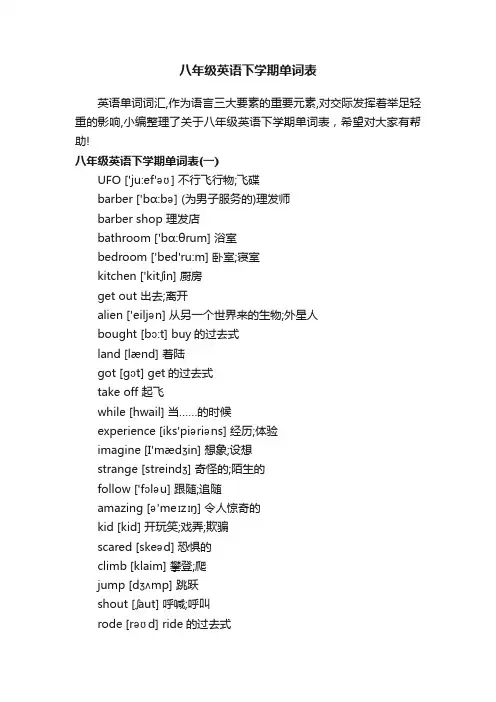
八年级英语下学期单词表英语单词词汇,作为语言三大要素的重要元素,对交际发挥着举足轻重的影响,小编整理了关于八年级英语下学期单词表,希望对大家有帮助!八年级英语下学期单词表(一)UFO ['ju:ef'əʊ] 不行飞行物;飞碟barber ['bɑ:bə] (为男子服务的)理发师barber shop 理发店bathroom ['bɑ:θrum] 浴室bedroom ['bed'ru:m] 卧室;寝室kitchen ['kitʃin] 厨房get out 出去;离开alien ['eiljən] 从另一个世界来的生物;外星人bought [bɔ:t] buy的过去式land [lænd] 着陆got [gɔt] get的过去式take off 起飞while [hwail] 当……的时候experience [iks'piəriəns] 经历;体验imagine [I'mædʒin] 想象;设想strange [streindʒ] 奇怪的;陌生的follow ['fɔləu] 跟随;追随amazing [ə'meɪzɪŋ] 令人惊奇的kid [kid] 开玩笑;戏弄;欺骗scared [skeəd] 恐惧的climb [klaim] 攀登;爬jump [dʒʌmp] 跳跃shout [ʃaut] 呼喊;呼叫rode [rəʊd] ride的过去式train station ['steiʃən] 火车站ran [ræn] run的过去式run away 逃跑;跑掉anywhere [enihwɛə] 任何地方met [met] meet的过去式come in 进来happen ['hæpən] 发生accident ['æksidənt] 事故Beijing Internation Airport ['ɛəpɔ:t] 北京国际机场plane [plein] 飞机heard [həːd] hear的过去式modern ['mɔdən] 现代的;现代化的kill [kil] 杀死;致死Memphis [memfis] 孟菲斯(美国田纳西州西南部一城市) murder ['mə:də] v.and n.谋杀;凶杀hear about 听说bright [brait] adj.明亮的;发亮的playground ['pleiɡraund] n.运动场;操场bell [bel] n.钟;铃;门铃rang [ræŋ] v.ring的过去式told [təʊld] v.tell的过去式close [kləuz] v.关闭silence ['sailəns] n.寂静;沉静take place [pleis] 发生recent ['ri:snt] adj.最近的;近来的World Trade Center [wə:ld,treid, 'sentə] 世界贸易中心destroy [dis'trɔi] v.破坏;毁坏terrorist ['terərɪst] n.恐怖分子meaning ['mi:niŋ] n.意思;含义as……as 像……(一样)became [bɪ'keɪm] v.become的过去式flight [flait] n.航班,班机earth [ə:θ] n.地球hero ['hiərəu] n.英雄flew [flu:] v.fly的过去式八年级英语下学期单词表(二)have a great time 玩的愉快organize ['ɔ:ɡənaiz] v.组织take away 拿走clean-up 清除;打扫flower ['flauə] n.花agent ['eidʒənt] n.代理人;代理商around the world 在世界各地make a living 谋生against [ə'ɡenst, ə'ɡeinst] prep.反对、对…不利charity ['tʃæriti] n.慈善团体;慈善事业chance [tʃɑ:ns] n.机会;机遇all the time 一直injured [ɪndʒə] adj.受伤的;受损害的sincerely [sɪn'sɪəlɪ] adv.真诚地lawyer ['lɔ:jə] n.律师tonight [tə'nait] n.今晚;今夜mobile phone ['məubail] 移动电话REVIEW OF UNITS 1-5What’s the problem? ['prɔbləm] 怎么了?fat adj.胖的;肥的window ['windəu] n.窗户play football 踢足球consequence ['kɔnsikwəns] n.结果explain [iks'plein] v.解释;说明following ['fɔləuiŋ] adj.下列的;下述的八年级英语下学期单词表(三)not at all 一点也不turn down 把……调低;关小yard [jɑ:d] n.院子right away 立刻;马上task [tɑ:sk] n.任务;工作;作业poster ['pəustə] n.海报waitress ['weɪtrɪs] n.女服务生brought [brɔ:t] v.bring的过去式solution [sə'lu:ʃən] n.解答、解决办法line n.排;队;列wait in line 排队等候annoy [ə'nɔi] v.使恼怒,使生气annoyed [ə'nɔɪd] adj.恼怒的,生气的polite [pə'lait] adj.有礼貌的;客气的perhaps [pə'hæps] adv.或许;大概door n.门cut in line 插队hasn't = has notterm [tə:m] n.术语etiquette ['etɪ'ket] n.礼节normal ['nɔ:məl] adj.正常的;正规的behavior [bɪ'heɪvjə] n.行为;举止;表现at first 首先Asian ['eɪʒən, 'eɪʃən] adj.亚洲的;亚洲人的uncomfortable [ʌn'kʌmfətəbəl] adj.不舒服的impolite ['ɪmpə'laɪt] adj.无理的;粗鲁的allow [ə'lau] v.允许; 准许keep …down 控制;抑制voice [vɔis] n.声音public ['pʌblik] n.公众take care 当心;小心cough [kɔf] v.咳嗽sneeze [sni:z] 打喷嚏break [breik] v.打破,违背reak the rule 违反规则politely [pə'laɪtlɪ] adv.客气地;斯文地smoke [sməuk] v.抽烟;吸烟put out 扑灭、熄灭(火)、关灯cigarette ['siɡə'ret] n.香烟criticize ['kritisaiz] v.批判careful ['kɛəful] adj.当心;小心drop [drɔp] v.落下;掉下litter ['litə] n.垃圾pick [pik] v.采;摘;挑选pick …up 捡起behave [bi'heiv] v.举止;表现。
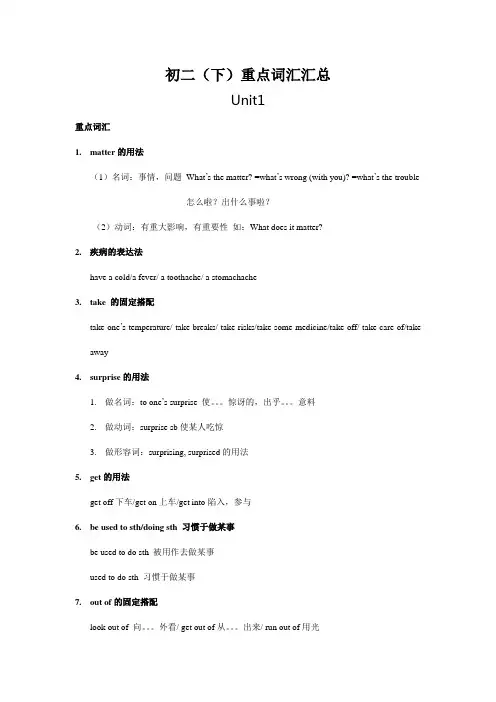
初二(下)重点词汇汇总Unit1重点词汇1.matter的用法(1)名词:事情,问题What’s the matter? =what’s wrong (with you)? =what’s the trouble怎么啦?出什么事啦?(2)动词:有重大影响,有重要性如:What does it matter?2.疾病的表达法have a cold/a fever/ a toothache/ a stomachache3.take 的固定搭配take one’s temperature/ take breaks/ take risks/take some medicine/take off/ take care of/take away4.surprise的用法1.做名词:to one’s surprise 使。
惊讶的,出乎。
意料2.做动词:surprise sb使某人吃惊3.做形容词:surprising, surprised的用法5.get的用法get off下车/get on上车/get into陷入,参与6.be used to sth/doing sth 习惯于做某事be used to do sth 被用作去做某事used to do sth 习惯于做某事7.out of的固定搭配look out of 向。
外看/ get out of从。
出来/ run out of用光Unit2重点词汇1.Alone/lonelyalone为形容词,意为“单独的”,只作表语,不能作定语.侧重说明独自一人,没有助手或同伴,没有感情色彩的,只表示客观的状态.lonely意为“孤独的”,表示主观上感到孤独、寂寞,有较浓的感***彩,指因缺少朋友、同情、友谊等产生的一种悲伤和忧郁的感情.它为形容词,在句中作表语或定语.作定语时,意为“荒凉;偏僻”,多修饰表示地点的名词.alone还可以作副词.alone 副词adv.单独;独自She went home alone.她独自回家去了.After his wife died,he lived alone.他的妻子死后,他一个人生活.ed to/ be used to doing/ be used to doUsed to do: 过去常常做某事,意思为现在不做了Be used to sth/doing sth: 习惯于做某事,to在这为介词Be used to do sth: 被用作去做某事,被动语态的一种形式3.Give out/give awaygive away1.捐献,赠送He gave away most of his money to charity.他把大部分金钱捐给了慈善事业.2.颁发,分送The mayor gave away the prizes at the school sports day.在学校运动会那天市长颁发了奖品.3.(由于粗心)丢失、错过(机会)They gave away their last chance of winning the match.他们错过了比赛取胜的最后机会. give sth/sb away (有意无意地)泄露She gave away state secrets to the enemy.她向敌人泄露了国家机密.His broad Liverpool accent gave him away.他那浓重的利物浦口音暴露了他的身份.give sth. off放出(气味,热量等)The cooker is giving off a fuuny smell.锅里正在冒出一种怪味.give out1.用尽;耗尽Her patience finally gave out.她终于失去耐心了.2.(指引擎、发动机)停止运转;失灵One of the plane's engines gave out in the mid-Atlantic.在大西洋中部上空飞机的一个引擎失灵了.give sth.out1.分发;散发The teacher gave out the examination papers.老师分发了试卷.2.放出;发出The radiator is giving out a lot of heat.散热器散发着大量的热.3.宣布;广播The news of the President's death was giving out in a broad-cast.总统故去的消息在无线电中广播了.其中在表示“散发;放出(气味,热量等)的意思时,give off 和give out 的用法是一样的,都解释为"send out or emit sth."Put off/take off/get off/ set off 4.Interest/interesting/interestedInterest做动词意思为使别人感兴趣interest sb.Interesting 做形容词,多以物做主语,表示使别人感兴趣的Interested 做形容词,多以人做主语,表示对。
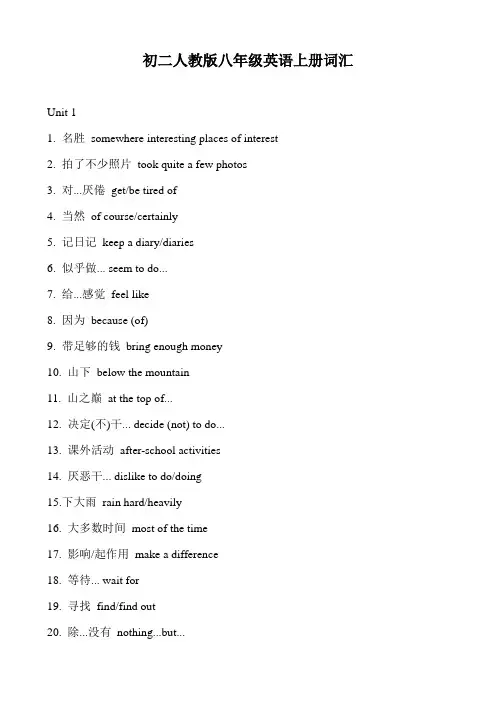
初二人教版八年级英语上册词汇Unit 11. 名胜somewhere interesting places of interest2. 拍了不少照片took quite a few photos3. 对...厌倦get/be tired of4. 当然of course/certainly5. 记日记keep a diary/diaries6. 似乎做... seem to do...7. 给...感觉feel like8. 因为because (of)9. 带足够的钱bring enough money10. 山下below the mountain11. 山之巅at the top of...12. 决定(不)干... decide (not) to do...13. 课外活动after-school activities14. 厌恶干... dislike to do/doing15.下大雨rain hard/heavily16. 大多数时间most of the time17. 影响/起作用make a difference18. 等待... wait for19. 寻找find/find out20. 除...没有nothing...but...21. 激动地跳上跳下jump up and down in excitement22. 沿途along the way23. 继续go on/continue24. 最后5小时the last 5 hoursUnit 21. 几乎不做家务hardly ever do housework2. 去看牙医go to the dentist3. 通过这个节目through this program4. 摇摆舞swing dance5. 保持健康(两种) be in good health / keep healthy6.一起看电视watch TV together7. 消失;死亡(过)die/died8. 十分忙(两种)quite full/ quite busy9. 充满be full of10.比如喝咖啡such as drinking coffee11.对身心健康be healthy for body and mind12.杂志的作者the writer of the magazine13.至少/至多at least/most14.几乎每天almost everyday15.少于/多于百分之八十less/more than eighty percent16.大概每周一次/两次maybe once/twice a week17.然而;不过however18.指向point at19.上网(三种) go online/surf the Internet/ use the computer20....的结果the result of21.尽管althoughUnit 31.更外向的be more outgoing than2.两者都both of/ both A and B3.哪一个更好which one is better4.唱得更响亮sing(sang) more loudly than5.说得更轻柔speak more quietly6.更努力be more hardworking7.赢了唱歌比赛(过去式) Won the singing competition8.唱得更清楚sing more clearly9.虽然though(不能与but连用)10.小学Primary school11.取得好成绩get good grades__12.获取信息get information13.严肃对待be serious about14.像一面镜子be like a mirror15.与..相像be similar to16.做..很必要It is necessary to do sth17.真的关心truly care about18.与之相同the same as19.使人发笑make sb. laugh20.俗话说得好as a saying goes21.伸出援手reach for one’s hand22.触动心灵touch one’s heart23.摔坏手臂break(broke)one’s arms24.和某人分享share with sbUnit 41.最好的电影院the best movie theater2.最大的屏幕the biggest screen3.最舒适的座位the most comfortable seat4.买最便宜的票buy tickets the most cheaply5.最精心地选择歌曲choose songs the most carefully6.最有创造力的才艺表演the most creative talent show7.认真对待take…seriously8.发挥作用play a role in9.一日三餐three meals a day10.最令人兴奋的魔术师之一One of the most exciting magicians11.最差的服务the worst service12.例如for example13.得到好的奖品get good prize14.唱的最优美sing the most beautifully15.穷人the poor16.新鲜的空气fresh air17.放弃give up18.记者reporter19.adv.相当,十分adj.漂亮的pretty20.菜单menu21.扮演v. act22.拥挤be crowded with23.各种各样的all kinds of24.离家近be close to homeUnit 51.不介意做某事don’t mind doing sth.2.无法忍受做某事can’t stand doing3.计划做某事plan to do4.希望做某事hope to do sth.5.期望做某事expect to do sth6.查明,弄清find out7.有一个关于...的讨论have a discussion about8.碰巧做某事happen to do sth9.讲笑话tell jokes10.代替take the place of11.做得好do a good job12.参军join the army13.装扮成dress up as/like14.像...一样简单as simple as15.准备好做某事be ready to do sth.16.主要原因main reason17.变得成功和富有become successful and rich18.出现在appear in/on19.著名的电影famous film20.普通人common man21.有意义的/无意义的meaningful/meaningless22.美国文化American culture23.可能会失去女朋友might lose the girlfriend24.不幸运的unlucky25.有教育意义的新闻educational news26.一个卡通人物a cartoon characterUnit 61.长大(过去式)grow up grew up2.程序员/厨师/飞行员computer programmer/cook/pilot3.小提琴手/钢琴家/科学家violinist/pianist/scientist4.对...有把握/确保be sure about/make sure5.大学毕业finish college6.他们自己吃药take some medicine by themselves7.去伦敦接受教育go to London for education8.坚持写文章keep on writing articles9.把...送给司机/医生(过去式)send...to the doctor/driver10.下定决心成为一名工程师make a resolution to be an engineer11.成为足球队一员make the soccer team12.另外一门外语(外国人)another foreign language (foreigner)13.能够去上大学be able to go to a university14.许下诺言make a promise15.在...开始at the beginning of16.提升我们的生活improve our lives17.写下来年计划write down the plan for the next/coming year18.身体的健康physical health19.和更好的计划有关have to do with a better plan20.质疑这个单词的意义question the meaning of the word21.开始一个像画画的业余爱好take up a hobby like painting22.做每周的计划make a weekly plan23.做作业do schoolwork24.关于我自己的私人的自我提升about my own self-improvement25.讨论不同种类的人际关系v./n. discuss different kinds of relationships26.太难以致不能坚持too difficult to keepUnit 71.在纸上on paper2.活到200岁live to be 200 years old3.将会有更少的污染will be less pollution4.关于未来的预测the prediction about the future5.处于极大危险之中be in great danger6.种植更多的树去保护环境plant more trees to protect the environment7.居住在地球上live on the earth8.参与到保护地球中来play a part in saving the earth9.在海里建造更多的建筑build more buildings in the sea10.搬去其他星球move to other planets11.世界和平word peace12.街对面的一栋公寓an apartment across the street from here13.乘火箭去月球fly a rocket to the moon14.成为一名航天员be an astronaut15.居住在太空站live on a space station16.已经在危险的地方或者工厂里工作了already work in dangerous places or factories17.反反复复地造车build cars over and over again18.像人类的仆人like human servants19.信不信由你believe it or not20.一些日本的机器人some robots in Japan21.同意/不同意某人agree/disagree with...22.可能花费数百年时间may take hundreds of years23.有不同的形状have different kinds of shapes24.寻找建筑物里面的人look for the people inside the buildings25.倒塌跌倒(过去式)fall/fell down26.似乎不可能seem impossible27.甚至能够像人类一样思考even think like humans28.你同意哪一方?which side do you agree?29.可能只会养只鸟probably keep a bird30.在寒假期间during the winter holidayUnit 81.剥桔子peel the oranges2.切香蕉cut up the bananas3.pour...into 把...倒入4.打开机器turn on the machine5.多少奶酪/苹果how much/many6.在那之后after that7.在...增加add... to...8.如何植树how to plant a tree9.从...借书borrow ...from...10.两片面包two pieces of bread11.用...填满... fill... with... / be filled with / be full of12.把..和..混合mix up / mix... with...13.用...覆盖... cover... with... / be covered with14.把..切成薄片cut... into thin pieces15.把...招待... serve... to...16.把...视为see...as... / regard...as...17.主打菜the main dish18.传统食物traditional food19.在儿童节on Children’s Day20.在高温下at a high temperature21.再煮10分钟cook for another ten minutes22.该做...时间了It’s time to do... / It’s time for...23.团圆/团聚get together / reunion24.把...装盘place...in a plate25.忘记干某事forget to do sth.26.与...握手shake hands with27.两勺蜂蜜two spoons of honey28.制作水果沙拉make fruit salad29. 挖个洞(过去) dug a holeUnit 91.为考试做准备prepare for2.得了流感have the flu3.闲逛hang out4.追上,赶上catch up with5.没有做某事without doing sth6.期待做某事look forward to doing7.直到...才not...until8.有空be available9.乐意做某事be glad to do sth10.邀请我的同学invite my classmates11.接受邀请accept the invitation12.拒绝邀请refuse the invitation13.回复reply to14.在工作日on weekdays15.删除信息delete the information16.打印邮件print the information17.派对准备party preparation18.对..感到惊奇be surprised at19.开幕式the opening of20.学校音乐会the school concert21.事件种类kind of event22.数以百计的客人hundreds of guests23.在日历上on the calendar24.在白天during the daytimeUnit 101.班会a class meeting2.看视频watch a video/videos3.组织派对游戏organize party games4.给我一些建议give me some advice5.打车take a taxi6.环游世界travel around the world7.正常的生活normal life8.一位谨慎的年轻人a careful teenager9.遗失钱包lose one’s wallet10.肯定很生气certainly be angry11.建议某人做某事advise sb to do12.解决问题solve the problem13.犯粗心的错误make careless mistakes14.感到沮丧feel upset15.第一步the first step16.相信他自己trust himself17.有更多经验have more experience18.走三英里到学校walk three miles to school19.非常善解人意be really understanding20.还有谁who else提高记忆力的小技巧01.拒绝死记硬背如果没有把知识内化,所做的一切不过是徒劳而已。
初二英语上册单元词汇Unit11.锻炼,运动n&v.2.踩滑板,参加滑板运动v3.几乎不,几乎没有adv.4.曾经adv.5.一次adv.6.两次adv.7.次数n.8.在冲浪v.9.网络,互联网n.10.节目,表演n.11.结果,成果n.12.活跃的,积极的adj.13.对于,关于在方面,就而言prep.14.几乎,大约adv.15.破烂物,废弃的旧物n.16.牛奶n.17.咖啡n.18.薄片n.19.可乐n.20.巧克力n.21.饮,喝v.22.健康(状况)n.23.采访者n.24.习惯n.25.设法,试图,努力v.26.生活方式n.27.分数,成绩n.28.更好的adj&adv.29.同样的,相同的adj.30.像一样prep.31.不同的,有区别的adj.32.不同,差异,区别n.33.不健康的adj.34.或许,大概adv.35.虽然,即使conj.36.保持,使保持某种状态v.37.必须38.较少的,更少的adj.39.多久一次40.高中41.至于,关于42.垃圾食品43.多少44.当然45.照顾,照看46.大量,许多Unit 1 Keys:1.exercise n.2.skateboard v.3.hardly adv.4.ever adv.5.once adv.6.twice adv.7.time n.8.surf v.9.Internet n.10.p rogram n.11.r esult n.12.a ctive adj. 13.f or prep.14.a bout adv.15.j unk n.16.m ilk n.17.c offee n.18.c hip n.19.c ola n.20.c hocolate n.21.d rink vt.22.h ealth n.23.i nterviewer n.24.h abit n.25.t ry v.26.l ifestyle n.27.g rade n.28.b etter adj.&adv.29.s ame adj.30.a s prep.31.d ifferent adj.32.d ifference n.33.u nhealthy adj.34.m aybe adv.35.a lthough conj.36.k eep vt.37.m ust v.38.l ess adj.39.h ow often40.h igh school 41.a s for42.j unk food43.h ow many44.o f course45.l ook after46.a lot ofUnit21.事情,差错n.2.得/患(病)v.3.受凉,感冒n.4.胃痛,肚子痛n.5.疼/酸痛的adj.6.背部;n.后面的adj.7.臂,胳膊n.8.耳朵n.9.眼睛n.10.脚,足n.11.手n.12.头部n.13.腿部n.14.嘴,口腔n.15.脖子,颈部n.16.鼻子n.17.胃,肚子n.18.牙齿n.19.喉咙n.20.牙痛n. 21.发热,发烧n.22.休息v&n.23.蜂蜜n.24.牙医n.25.应该v.26.头痛n.27.以前adv..28.疾病n.29.劝告n.30.口渴的adj31.压力,加压于,使紧张n&v.32.提早地/提前地ad33.问题,令人困扰的事n.34.方式/方法/手段n.35.传统的/惯例的adj.36.相信,认为v.37.平衡n.38.虚弱(无力)的adj.39.草本植物/药草n.40.愤怒的/生气的adj.41.豆腐n.42.药物n.43.西方的adj.44.每人,人人pron.45.变得v.46.很少的,几乎没有的adj.47.继续是,保持,维持v.48.重要(大)的adj.49.平(均)衡的adj.50.饮食,节食n.51.瞬间,片刻n.52.直到…之时conj.53.听见,听说vt.54.受凉,感冒55.有压力的,紧张的56.有些,几个,少数57.此时,现在58.寄宿家庭Unit 2 Keys1.matter n.2.have v.3.cold n.4.stomachache n.5.sore adj.6.back n.7.arm n.8.ear n.9.eye n.10.f oot n.11.h and n.12.h ead n.13.l eg n.14.m outh n.15.n eck n.16.n ose n.17.s tomach n.18.t ooth n.19.t hroat n. 20.t oothache n.21.f ever n.22.r est n&v.23.h oney n.24.d entist n.25.s hould v.26.h eadache n.27.a go adv.28.i llness n.29.a dvice n.30.t hirsty adj.31.s tress n&v.32.e arly adv.33.p roblem n.34.w ay n.35.t raditional adj.36.b elieve v.37.b alance n&v.38.w eak adj.39.h erb n.40.a ngry adj.41.t ofu n.42.m edicine n.43.w estern adj.44.e veryone pron.45.g et v.46.f ew adj.47.s tay v.48.i mportant adj.49.b alanced adj.50.d iet n.51.m oment n.52.u ntil conj.53.h ear vt.54.h ave a cold55.b e stressed out56.a few57.a t the moment58.h ost familyUnit31.临时照顾(小孩)2.宿营,露营3.计划,规划4.西藏5.徒步旅行,远足6.离开,向远处7.发送8.明信片9.自行车10.乘骑,搭乘11.观光,游览12.捕鱼,钓鱼13.租用,出租14.意大利15.著名的,出名的16.希腊17.西班牙18.欧洲19.湖泊20.离开,出发;留下,落下21.农村22.大自然,自然界23.忘记24.结束,完成25.泰国26.旅行者27.多久28.回来29.去度假30.很,非常,常常Keys:1.babysit vt.2.camp n.3.plan n.4.Tibet5.hike v.6.away adv7.send vt8.postcard n9.bike n10.r ide v11.s ightseeing n12.f ishing n13.r ent v14.I taly n15.f amous adj16.G reece n17.S pain n18.E urope n19.l ake n20.l eave n21.c ountryside n22.n ature n23.f orget vt24.f inish vt25.T hailand n26.t ourist n27.h ow long28.g et back29.t ake a vocation30.a lotUnit4.1.地铁n2.火车n3.四十num4.五十num5.六十num6.七十num7.八十num8.九十num9.一百num10.分钟n11.花费vt12.表示交通、传递的方式13.远的,遥远的adj14.公里、千米n15.淋浴v16.快的,迅速的adj17.自行车n18.早的,提早的adj19.英里n20.车站n ,停止vt 21.公共交通,运输n22.北方的,北部的adj23.地区,区域n24.依赖,依靠vi25.河流,江n26.小船n27.一定,必须28.更(多,大)的adj29.比conj30.方法,手段,工具n31.小汽车n32.城镇n33.生病的adj34.担心,忧虑v35.这么,那么adv36.十分,非常adv37.乘公共汽车38.多远39.决定于,视。
初二下册英语单词重点词汇1. action(n.行动;动作)- something that someone does- He always puts his words into action.(他总是言出必行。
)2. adventure(n.冒险)- an exciting or dangerous experience- We went on an adventure in the mountains.(我们在山上进行了一次冒险。
)3. ancient(adj.古老的)- very old- The ancient city was full of historical sites.(这座古城充满了历史遗迹。
)4. band(n.乐队)- a group of people who play music together- I enjoy listening to live music performed by a band.(我喜欢听乐队演奏的现场音乐。
)5. beauty(n.美丽)- the quality of being pleasing, especially to look at- The sunset over the ocean was a breathtaking beauty.(海上的日落美景让人惊叹。
)6. behavior(n.行为)- the way someone acts- Her behavior in class is always polite and respectful.(她在课堂上的行为总是有礼貌和尊重。
)7. belong(v.属于)- to be owned by someone- This book belongs to me, not you.(这本书是我的,不是你的。
)8. borrow(v.借)- to take something from someone with the intention of returning it- Can I borrow your pen for a moment?(我能借用一下你的钢笔吗?)9. brave(adj.勇敢的)- showing no fear of dangerous things- The firefighters were brave enough to enter the burning building.(消防员们勇敢地进入了起火的建筑物。
1 初二英语词汇 834 lesson n 课,功课 835 fun n 有趣 836 when conj 当......时 837 traffic n 交通 838 bad adj 坏的 839 matter要紧,有关系 840 on time 准时 841 September n 九月 842 happy 快乐的,幸福的 843 best 最好的(地) 844 wish 祝愿,希望,想要 845 second 第二(的) 846 idea 主意,想法,意见 847 last 最后的,刚过去的 848 given name . 名字 849 mean v 表示...的意思,意味着 850 meaning n 意思,意义,含义 851 important adj 重要的,重大的 852 use v 用,使用,运用 853 Ms n 女士(用于婚姻状况不明的女名) 854 before 在..之前,以前 855 never 从来,决不 856 just adv 刚刚,方才 857 third 第三的 858 afraid adj 害怕的 859 live v 居住 860 sound 声音,听起来 861 have to 不得不,必须 862 time n 次数 863 more adv 更,更加 864 not...any more 不再 865 laugh v & n 笑,大笑,笑声 866 waste 浪费,废弃物 867 a waste of time 浪费(白费)时间 868 fifth 第五(的) 869 trip 旅游,旅行 870 field trip 野外旅游 871 hometown 故乡,家乡 872 discuss v 讨论,议论 873 fish v 钓鱼 874 fishing n 钓鱼 875 go fishing 去钓鱼 876 east 东方(的),东部(的) 877 agree v 同意,赞成 878 boating n 划船 879 go boating 去划船 880 maybe 也许,大概 881 mountain n 山,高山 882 hike 远足,徒步旅行 883 hiking n 徒步旅行 884 go hiking 去徒步旅行 885 picnic n 野餐 886 the day after tomorrow 后天 887 top n 顶部 888 problem 问题,难题 889 quick 快的,迅速的 890 quickly 快地,迅速地 891 start v 开始,着手 892 trip over (被...)绊倒 893 tired adj 累,疲乏 894 hurry v 赶快,慌忙 895 hurry up 赶快 896 tie v 捆,(系,栓)紧 897 die v 死亡 898 city n 城市 899 take v 花费 耗 900 eighth num 第八 901 salesgirl n 女售货员 902 far 远的(地) 903 beautiful adj 美丽的, 904 together adv 一起 905 autumn n 秋天,秋季 906 festival 节日(的), 907 ninth 第九(的) 908 free自由的,空闲的 909 mid-autumn n 中秋 910 mooncake n 月饼 911 nut n 坚果,坚果核 912 sweet 甜的,可爱的 913 inside 在...里面 914 store n (美)商店,大百货公司 915 come over 过来,顺便来访 916 thanksgiving 感谢, 917Thanksgiving=Thanksgiving Day 感恩节 918 get together 相聚 919 October n. 十月 920 taste 品尝,有...味道 921 pie n馅饼 922 outside 在...外 923 in the open air在户外,在野外 924 harvest n 收获 925 than 比....,比较.... 926 another另一个(的),又一个(的) 927 delicious adj 美味的,可口的 928 better adj (good或well的比较级)更好的 929 pumpkin n 南瓜 930 twelfth 第十二(的) 931 turkey n 火鸡 932 celebrate v 庆祝 933 wait v 等,等待 934 feed v 喂,饲养 935 cow n 母牛,乳牛 936 interesting adj 有趣的, 937 tractor n 拖拉机 938 taxi n 出租汽车 939 slow 慢的,缓慢的 940 slowly adv 缓慢地 941 grow v 种植,生长 942 wheat n 小麦 943 country n 乡村,郊外 944 hear v 听见,听说 945 bleat 羊叫(声) 946 agree with 同意...意见(想法) 符合,一致 947 corn玉米,谷类庄稼 948 most (many或much 2
的最高级)最多的 949 summer夏天,夏季 950 winter n 冬天,冬季 951 stop v 停止,中止 952 pick v 采摘 953 exciting adj 令人兴奋的 954 town n 城镇 955 star n 星星,恒星 956 until 到...为止 957 till (直)到...为止 958 college n 学院,高等专科学校 959 farming 农业,务农 960 somebody某人,有人 961 nobody 没有人 962 shall (我,我们)将,会 963 zoo n 动物园 964 nothing pron 没有什么,没有东西 965 dolphin n 海豚 966 show n & v 演出,展览 给...看,出示 967 gate n 大门 968 land n 陆地,土地 969 just adv 仅仅,只有 970 grass n 草,草地 971 dangerous adj 危险的 972 panda n 熊猫 973 lion n 狮子 974 elephant n 象 975 monkey n 猴子 976 tiger n 老虎 977 deer(pl.deer) n 鹿 978 snake n 蛇 979 rabbit n 兔子 980 duck n 鸭 981 fox n 狐狸 982 horse n 马 983 bear n 熊 984 cage n 笼(子),鸟笼 985 should (shall的过去式)将,会,应该 986 forest n 森林 987 feel v 觉得,感到 988 if conj 假如,如果 989 fall v 落下,跌倒 990 climb v 爬,攀登 991 finish v 完成,结束 992 cinema 电影院,电影 993 seafood n 海鲜,海产食品 994 twentieth 第十二 995 baby n 婴儿,幼畜 996 back n 背部,后面 997 place n 地点,地方 998 twenty-first 第二十一 999 bank n 银行 1000 theatre(theater) n 剧场, 1001 bookshop n 书店 1002 toilet n 厕所 1003 museum n 博物馆 1004 front 前面(的),前部 1005 in front of . 在...前面 1006 left 左(的),左边(的) 1007 right 右(的),右边(的) 1008 side n 边,面 1009 on the left/right side phr. 在左(右)边 1010 all the same. 仍然,还是 1011 need v 需要,必需 1012 ask for 请求,询问 1013 along prep 沿着,顺着 一起,一道 1014 road n 道路,公路 1015 turn v (使)转动,(使)翻动 1016 turning n 拐弯处 1017 metre n 公尺,米 1018 kilometre n 公里,千米 1019 had better (do)最好(做...) 1020 coin n 硬币 1021 keep v 保持,留住 1022 as conj 按照,如同 1023 moment n 片刻,瞬间 1024 tell v 告述,讲述, 1025 street n 街道 1026 next to 相邻,靠近 1027 around prep 在...周围,环绕着 1028 lift n 电梯 1029 up and down 上上下下,来来回回 1030 busy 忙的,繁忙的 1031 team n 队,组 1032 centre(center) n 中心 1033 popular adj 大众的,流行的 1034 soccer n 英式足球 1035 quite adv 很,十分 1036 month n 月 1037 village n 村庄,乡村 1038 strong adj 强壮的,坚强的 1039 was v be(am,is,are)的过去式 1040 yesterday 昨天 1041 November n 十一月 1042 ill adj 病的 1043 hope v 希望 1044 composition n 作文 1045 remember 记起,想起 1046 were v 动词be(are)的过去式 1047 bit n 一点儿,小片 1048 a bit . 一点儿 1049 healthy adj 健康的,健壮的 1050 grow up 成长,长大 1051 visit v 参观,访问,拜访 1052 ago adv 以前 1053the day before yesterday 前天 1054 enjoy v 喜欢,享受...乐趣 1055 world n 世界 1056 at the same time . 同时 1057 a moment ago 刚才